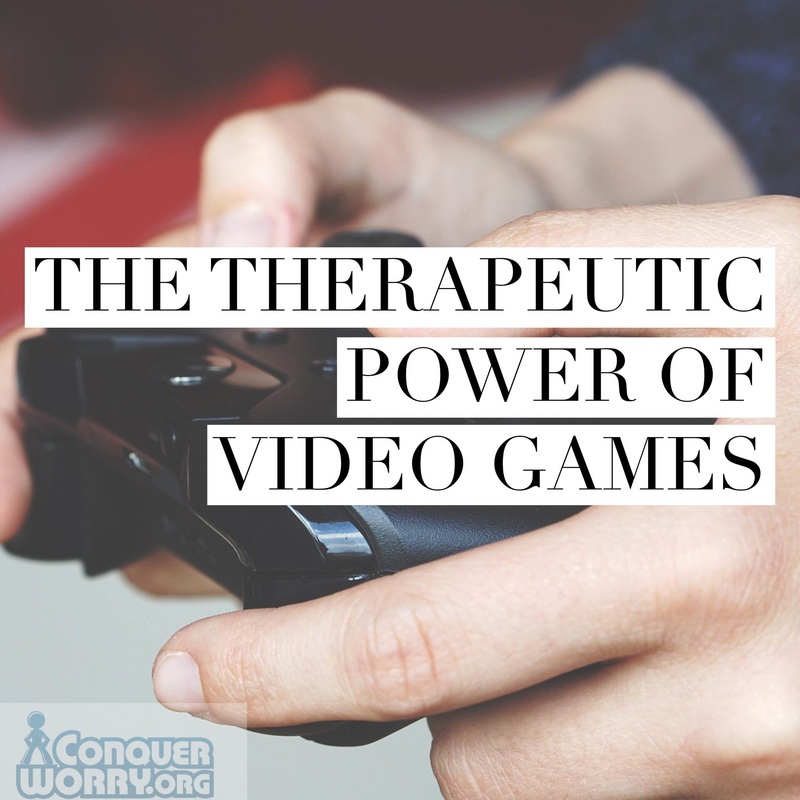|
Guest post by Luke Cochran Edit and Post design by Christy Zigweid Photo by superanton via Pixabay CC made using @WordSwagApp Sitting deep in a closet under my basement stairs lies my PlayStation 3. For years, it has been sitting there unused, dormant. However, a recent study has motivated me to dig it out of its tomb and donate it to help those in need. In a 2012 study by The University of Utah, video games had a positive impact on children diagnosed with chronic illnesses. Much of the impact came from the mental stimulation users experience when gaming. The study outlines how the patients interacted with games designed for therapeutic use. The University News Center describes how, "their own Patient Empowerment Exercise Video Game (PE Game), an activity-promoting game specifically designed to improve resilience, empowerment, and a “fighting spirit” for pediatric oncology patients." The study also included other games noted for their therapeutic use with chronic illness. Click here to see a preview of some of the games used in the study. The video games used were also renowned for their promotion of "positive attitude and empowerment" - feelings that the study suggests stem from a games ability to "activate positive emotions and reward systems." This helped strengthen a "fighting spirit" for the patients, trickling down to other health related benefits. Playing a Role in the Future of Medicine Roger Altizer, a professor at the University of Utah’s College of Fine Arts and director of game design and production for the program, pointed towards the role the games can play in the future of personalized medicine. He spoke on how these games can motivate people in very individual ways because of how engaging and immersive the experience can be. With this news comes not only reassurance that my countless hours on PlayStation 3 were of some benefit, but there is now so much possibility ahead for those children diagnosed with chronic illnesses. Just as people learn in different ways, so do patients when responding to different forms of treatment. While it will be a challenge to develop games tailored for therapeutic development, it should be in no comparison to the benefits it can provide so many people. Therefore, instead of letting my PlayStation 3 collect dust, I think I'll put it to good use. Sending it to an organization like GameCrate (www.GameCrate.us) will make sure my games are reaching their full potential. Connect with Luke
0 Comments
 Summary: "In the past 13 years, 217,409 incidents of anxiety disorders were diagnosed among the active component of the US Armed Forces, according to data from the Armed Forces Health Surveillance Center's Medical Surveillance Monthly Report. "In the US Armed Forces, mental disorders ... are a leading cause of morbidity, disability, health care service utilization, lost duty time and attrition from military service," Army Col. William Corr, deputy director of the division of epidemiology and analysis at the Armed Forces Health Surveillance Center, said in a press release. "Incidence rates of mental disorders diagnoses overall and anxiety disorders in particular have increased sharply among US military members during the past 10 years." From 2000 to 2012, the unadjusted incidence rate of anxiety disorder diagnosis among active members of the US Army, Navy, Air Force, Marine Corps and Coast Guard was 117.2 per 10,000 person-years. "Non-specific anxiety disorder" was the first anxiety disorder-related diagnosis among 205,717 incident cases. According to the report, more specific anxiety-related disorders were diagnosed among many of these active members, including generalized anxiety (14.3%), panic disorder without agoraphobia (8.2%), specified phobic disorders (4.5%) and obsessive-compulsive disorder (1.6%). Additionally, within 1 year before or after their case-defining anxiety disorder encounter, about one-third of service members diagnosed with an anxiety disorder also were diagnosed with an adjustment (34.3%) or a depressive (33.5%) disorder. Phobic disorders accounted for 21,675 cases and obsessive-compulsive disorders accounted for 8,370 cases. In terms of health care burdens during the 13-year period, anxiety disorders were responsible for 93,992 hospital bed days; researchers noted a 316% increase in anxiety disorder-related hospital bed days from the first to the last year of the study period." Full Article: Click Here  Both the BBC and CBS News are reporting that depression can make your cells age faster, thus making us biologically older. Both articles are based on research published in Molecular Psychiatry this week. BBC Article: Click Here CBS Article: Click Here  New research suggests that drinking sweetened beverages, especially diet drinks, is associated with an increased risk of depression in adults while drinking coffee was tied to a slightly lower risk. The study was released January 8 and will be presented at the American Academy of Neurology's 65th Annual Meeting in San Diego, March 16 to 23, 2013. "Sweetened beverages, coffee and tea are commonly consumed worldwide and have important physical -- and may have important mental -- health consequences," said study author Honglei Chen, MD, PhD, with the National Institutes of Health in Research Triangle Park in North Carolina and a member of the American Academy of Neurology. The study involved 263,925 people between the ages of 50 and 71 at enrollment. From 1995 to 1996, consumption of drinks such as soda, tea, fruit punch and coffee was evaluated. About 10 years later, researchers asked the participants whether they had been diagnosed with depression since the year 2000. A total of 11,311 depression diagnoses were made. People who drank more than four cans or cups per day of soda were 30 percent more likely to develop depression than those who drank no soda. Those who drank four cans of fruit punch per day were about 38 percent more likely to develop depression than those who did not drink sweetened drinks. People who drank four cups of coffee per day were about 10 percent less likely to develop depression than those who drank no coffee. The risk appeared to be greater for people who drank diet than regular soda, diet than regular fruit punches and for diet than regular iced tea. "Our research suggests that cutting out or down on sweetened diet drinks or replacing them with unsweetened coffee may naturally help lower your depression risk," said Chen. "More research is needed to confirm these findings, and people with depression should continue to take depression medications prescribed by their doctors." The study was supported by the National Institutes of Health, the National Institute of Environmental Health Sciences and the National Cancer Institute." Full Report: Click Here  By: Rachel Browne Summary: "One in seven Australians admits to experiencing severe to extremely severe depressive symptoms with almost half citing job-related issues as a source of the stress. The latest snapshot of the nation's mental health by the Australian Pyschological Society paints a distressing picture of workers, with an increasing number reporting they are suffering immense pressure. The survey, released on Sunday, found a significant decline in workplace wellbeing with workers being driven to despair as more pressure is put on increasing productivity and jobs become increasingly insecure. The society's executive director, Lyn Littlefield, said the findings reflected the fragile economic environment. ''There is much more pressure on the employers and the leaders to get performance out of their workers,'' Professor Littlefield said. The survey of 1500 people, which included almost 1000 workers, found that working Australians reported lower levels of wellbeing, job satisfaction and interest in their job, compared with previous years. Workers under the most pressure were aged between 36 and 45. Professor Littlefield said workplace stress was one of the most common causes of compensation claims and called on employers to improve their practices. ''The more stressed people are, workers compensation claims go up,'' she said. ''We know that wellbeing improves productivity. By turning things around, the employer gets a benefit.'' Worrying about money was the top source of stress identified in the research, with people aged 18 to 25 most likely to be anxious about their finances. ''People are worried about whether they will have enough money for everyday living requirements,'' Professor Littlefield said. One in seven participants reported depressive symptoms in the severe to extremely severe range, with significantly more reporting moderate to severe levels of distress compared with previous years. ''People are reporting a considerable impact of that on their physical health and even on their mental health. It is having quite a widespread affect.''  Summary: Written by professors from Harvard and the University of Pennsylvania, this paper was published in the Journal of Personality and Social Psychology. They conducted 8 experiments on anxiety and its role in seeking advice. Conclusion: People struggling with anxiety are more likely to seek and accept advice than those who are not struggling. Self-confidence and information processing functions are impaired while experiencing anxiety and this plays into the conclusions. Most importantly, those struggling with anxiety are not as able to distinguish between good and bad advice, or identify potential conflicts of interest when seeking advice. By: F. Gino, A. Brooks, M. Schweitzer Full Paper: Click Here  Summary: 'Almost depression' is not a mental disorder, but a 'low mood.' "People who are almost depressed report a number of issues, including lower job satisfaction, lower satisfaction with their marriage and other personal relationships, more anxiety issues, less control over their lives and lower overall well-being than people who do not fall into the almost depressed range." The author states that 75% of low grade depression will result in full blown depression, and those who are depressed have 4 times the risk of heart disease and 9-16 times the risk of suicide. Solutions:
By Shelly Carson Full Story: Click Here Conquer Worry Would Like To Share Your Success Story!
We are currently conducting interviews and compiling stories from people who have conquered worry, anxiety or depression and are now living successful, happy lives. Your story could help others, so please click on the "Share Your Story" tab at the top and we will set-up a time to talk.  Summary: Harvard professor Francesca Gino, as well as Alison Wood Brooks & Maurice E. Schweitzer from University of Pennsylvania, conducted research into how anxiety affects decision-making. The team studied college students, putting them in anxiety inducing situations. They concluded that when students felt stressed, they were more likely to “take advice they were given and had a reduced ability to judge between good and bad advice.” Professor Gino’s Tips: Take a breather. Keep your eye on the goal, not the details. Be social. By: Will Yakowicz (@willyakowicz) Full Article: Click Here  Summary
Full Article: Click Here |
Build Your Action Based Stress Reduction System
Popular PodcastsOlympian Suzy Favor Hamilton - From Fame to Prostitution to Advocacy
Hall of Fame Basketball Star Chamique Holdsclaw on Mental Resilience Diana Nightingale on her husband Earl Nightingale's Principles for Mental Health Success JoAnn Buttaro on Date Rape & PTSD Survival Story: Its Never Too Late Gabe Howard on BiPolar Advocacy Phil Fulmer on Teen Suicide Prison, Bipolar and Mania with Andy Behrman Columbia Univeristy's Dr. Rynn on OCD Archives
March 2018
Categories
All
|




 RSS Feed
RSS Feed





